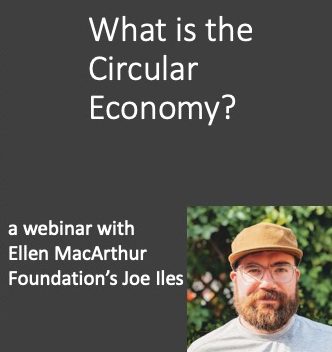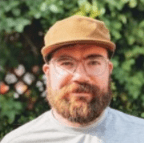Sovereign Seeds: Reclaiming MENA’s Agricultural Future
Reviving local food systems and unlocking rural prosperity

$15.00
Content: Video Webinar Presentation with Q&A
Length: 1:06:52
Premium Members get free access to the entire catalog of past webinars as well as invitations to upcoming, live programs.
$15.00Add to cart
Today’s economy is hugely wasteful. From phones and clothes, to food and buildings, since the Industrial Revolution our approach has been the same: ‘take, make, dispose’. But this mindset is no longer working. It’s reaching its limits for business, has massive negative impacts on the environment, and often fails to provide for people.
But we now have the knowledge and tools to build an economy that is fit for the 21st Century.
We need an economy that offers opportunities for growth and prosperity — one in which waste and pollution are designed out, and where we keep products and materials in use, and regenerate natural systems.
It’s an opportunity for startups, industries, as well as individuals, their communities and cities. This is the model of a circular economy, and a shift is happening today.
View this webinar to learn more about the guiding principles of a circular economy, and explore a series of case study examples that illustrate circular design spanning products, business models, and system-level innovations.
Looking beyond the current take-make-dispose extractive industrial model, a circular economy aims to redefine growth, focusing on positive society-wide benefits. It entails gradually decoupling economic activity from the consumption of finite resources, and designing waste out of the system. Underpinned by a transition to renewable energy sources, the circular model builds economic, natural, and social capital.
In a circular economy, economic activity builds and rebuilds overall system health. The concept recognizes the importance of the economy needing to work effectively at all scales – for large and small businesses, for organizations and individuals, globally and locally.
Transitioning to a circular economy does not only amount to adjustments aimed at reducing the negative impacts of the linear economy. Rather, it represents a systemic shift that builds long-term resilience, generates business and economic opportunities, and provides environmental and societal benefits.
In the past ten years, the circular economy concept has gained traction around the world. Businesses adopting this approach are finding new ways to collaborate, interact with customers and discover competitive advantage. It’s being applied as a way to reach the Sustainable Development Goals, and address complex challenges such as plastic pollution. As a design lens, the circular economy is unlocking creativity and innovation, enabling people to rethink products and services, or to create more productive, livable cities.
This webinar is presented by Joe Iles of the Ellen MacArthur Foundation, a charity launched in 2010 to accelerate the transition to a circular economy. The Foundation works across key areas including insight and analysis, business and government, learning, systemic initiatives and communications.
We’ll investigate the following questions:
What do we really mean by the term ‘circular economy’?
How are businesses, start-ups, institutions and regions putting these ideas into practice?
How can you get started with circular economy thinking?
Which resources are available to further your circular economy exploration?

As Editor in Chief of Circulate, the Ellen MacArthur Foundation's source for insight on the circular economy, Joe’s role is to help deliver leading commentary design, business, economics, cities, food and society, through the lens of a circular economy. Part of the Ellen MacArthur Foundation team since 2011, Joe also helped design and create the Disruptive Innovation Festival, an online festival of ideas, contributing to strategy, content and delivery. Now in its fifth year, the DIF invites thought-leaders, entrepreneurs, innovators, businesses, makers and learners to explore the changing economy and their role in it. The DIF runs for three weeks and features over 500 speakers annually, broadcasting to thousands of attendees. As part of the Editorial Team, Joe writes and curates entries into the Ellen MacArthur Foundation’s circular economy case study library, sharing success stories from businesses embedding the principles of regeneration and restoration into their operations.

Laurie Lane-Zucker is Founder and CEO of Impact Entrepreneur, PBC, an impact economy business that hosts the Impact Entrepreneur Network — a large, global network of “systems-minded” entrepreneurs, investors, and scholars of social and environmental innovation — and editor and publisher of Impact Entrepreneur, a digital magazine covering the emerging Impact Economy. For over 30 years, Laurie has been a “pioneer” (Forbes) and recognized leader in sustainability, social enterprise, and impact investing. Laurie was the founding Executive Director of the international environmental organization, Orion Society, which publishes the celebrated Orion Magazine, as well as the founder of a global sustainability think-tank, the Triad Institute, and Hotfrog, a Founding B Corporation, GIIRS Pioneer Company, and the first company ever to complete an equity transaction on an impact investment exchange. Laurie is the bestselling and multiple award-winning publisher and editor of books and magazines on sustainability and social impact — having worked with such acclaimed authors as Wendell Berry, Barry Lopez, Terry Tempest Williams, and David James Duncan — and the author of numerous articles on entrepreneurship and impact investing. Laurie is contributing author to the recently published academic textbook from World Scientific, Sustainability: Business and Investment Implications (2023).
At Impact Entrepreneur, we champion fearless, independent journalism and education, spotlighting the inspiring changemakers building the Impact Economy. Diversity, equity, sustainability, and democracy face unprecedented threats from misinformation, powerful interests, and systemic inequities.
We believe a sustainable and equitable future is possible—but we can't achieve it without your help. Our independent voice depends entirely on support from changemakers like you.
Please step up today. Your donation—no matter the size—ensures we continue delivering impactful journalism and education that push boundaries and hold power accountable.
Join us in protecting what truly matters. It only takes a minute to make a real difference.